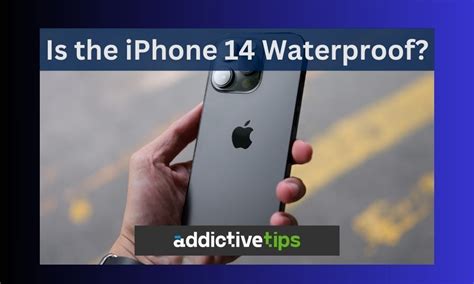Is the iPhone 14 Waterproof? Understanding its Water Resistance

Okay, here's an article draft optimized for the keyword "is the iPhone 14 waterproof," focusing on readability, SEO best practices, and providing valuable information to the reader.
`markdown
Preview: Thinking of taking your iPhone 14 for a swim? Before you do, it's crucial to understand its water resistance capabilities. This article dives deep into is the iPhone 14 waterproof, exploring its official rating, what it means in practical terms, and how to protect your device from water damage.
Understanding the iPhone 14's Water Resistance
The question of is the iPhone 14 waterproof is a common one. While many modern smartphones boast some level of water protection, it's important to differentiate between water resistance and waterproof. The iPhone 14 is not technically waterproof. It is water-resistant. Apple designs it to withstand accidental splashes and submersion under specific conditions.
What Does IP68 Mean for Your iPhone 14?
The iPhone 14 has an IP68 rating under IEC standard 60529. This rating is crucial in understanding is the iPhone 14 waterproof or rather, how water-resistant it truly is. Let's break down what IP68 signifies:
- IP: Ingress Protection – a standard measure of protection against solids (like dust) and liquids (like water).
- 6: Indicates complete protection against dust ingress. The device is dust-tight.
- 8: This is the water resistance rating. Specifically, the iPhone 14 can withstand submersion in freshwater at a maximum depth of 6 meters (approximately 19.7 feet) for up to 30 minutes.
- Age of the Device: Over time, the adhesives and seals that provide water resistance can degrade, especially with exposure to extreme temperatures or physical stress (drops, bending).
- Physical Damage: Even a tiny crack in the screen or housing can compromise the water resistance.
- Water Pressure: While the iPhone 14 can withstand submersion to 6 meters, the pressure at that depth could still force water past weakened seals. High-pressure water jets should be avoided.
- AppleCare+: AppleCare+ offers extended coverage and includes protection for accidental damage. However, even with AppleCare+, there is usually a deductible fee for repairs related to water damage. Always check the specific terms and conditions of your AppleCare+ plan.
- Dry Your iPhone Immediately: If your iPhone 14 gets wet, dry it off thoroughly with a soft, lint-free cloth.
- Don't Charge a Wet iPhone: Charging a wet iPhone can cause corrosion and permanent damage. Ensure the Lightning or USB-C port is completely dry before connecting it to a charger.
- Don't Use Heat to Dry: Avoid using hairdryers or placing your iPhone in direct sunlight to dry it. This can damage internal components.
- Consider a Waterproof Case: For added protection, especially if you're frequently around water (swimming, boating, etc.), invest in a waterproof case.
Important Note: These tests are conducted in controlled laboratory conditions. Everyday wear and tear can degrade the seals that provide this protection.
Factors Affecting Water Resistance
While the IP68 rating provides a benchmark, several factors can impact the real-world water resistance of your iPhone 14:
Type of Liquid: The IP68 rating is for freshwater*. Saltwater, chlorinated water (pools), soapy water, and other liquids can be more corrosive and potentially damage the internal components even if submerged for a short time.
Does AppleCare Cover Water Damage?
It's vital to understand Apple's stance on water damage. Generally, Apple's standard warranty does not cover liquid damage. This is because water damage is considered accidental damage and not a manufacturing defect.
Tips to Protect Your iPhone 14 from Water Damage
Even with its water resistance, taking preventative measures is crucial to prolong the life of your iPhone 14:
Avoid Deliberate Submersion: While the phone can* handle submersion, it's best to avoid it unless absolutely necessary.
Is the iPhone 14 Waterproof? Key Takeaways
In summary, while is the iPhone 14 waterproof is a common question, the most accurate answer is that it is water-resistant to a certain degree. Its IP68 rating offers protection against splashes and brief submersion in freshwater, but this protection is not absolute and can degrade over time. Taking precautions and understanding the limitations of its water resistance are vital to protect your investment.
Frequently Asked Questions (FAQ)
Here are some common questions regarding the iPhone 14 and water resistance:
Q: Can I take pictures underwater with my iPhone 14?
A: While technically possible, it's not recommended. The IP68 rating is for accidental submersion. Purposeful, prolonged underwater use increases the risk of water damage.
Q: What should I do if my iPhone 14 gets wet?
A: Immediately power off your iPhone 14, dry it thoroughly with a lint-free cloth, and allow it to air dry for several hours, ensuring the charging port is completely dry before plugging it in.
Q: Does saltwater damage the iPhone 14 more than freshwater?
A: Yes. Saltwater is more corrosive than freshwater and can cause significantly more damage to the internal components of your iPhone 14.
Q: Will the iPhone 14's water resistance be affected if I replace the screen?
A: Yes, unless the screen is replaced by Apple or an authorized service provider that properly reseals the device to maintain its IP68 rating, replacing the screen will likely compromise its water resistance.
`





